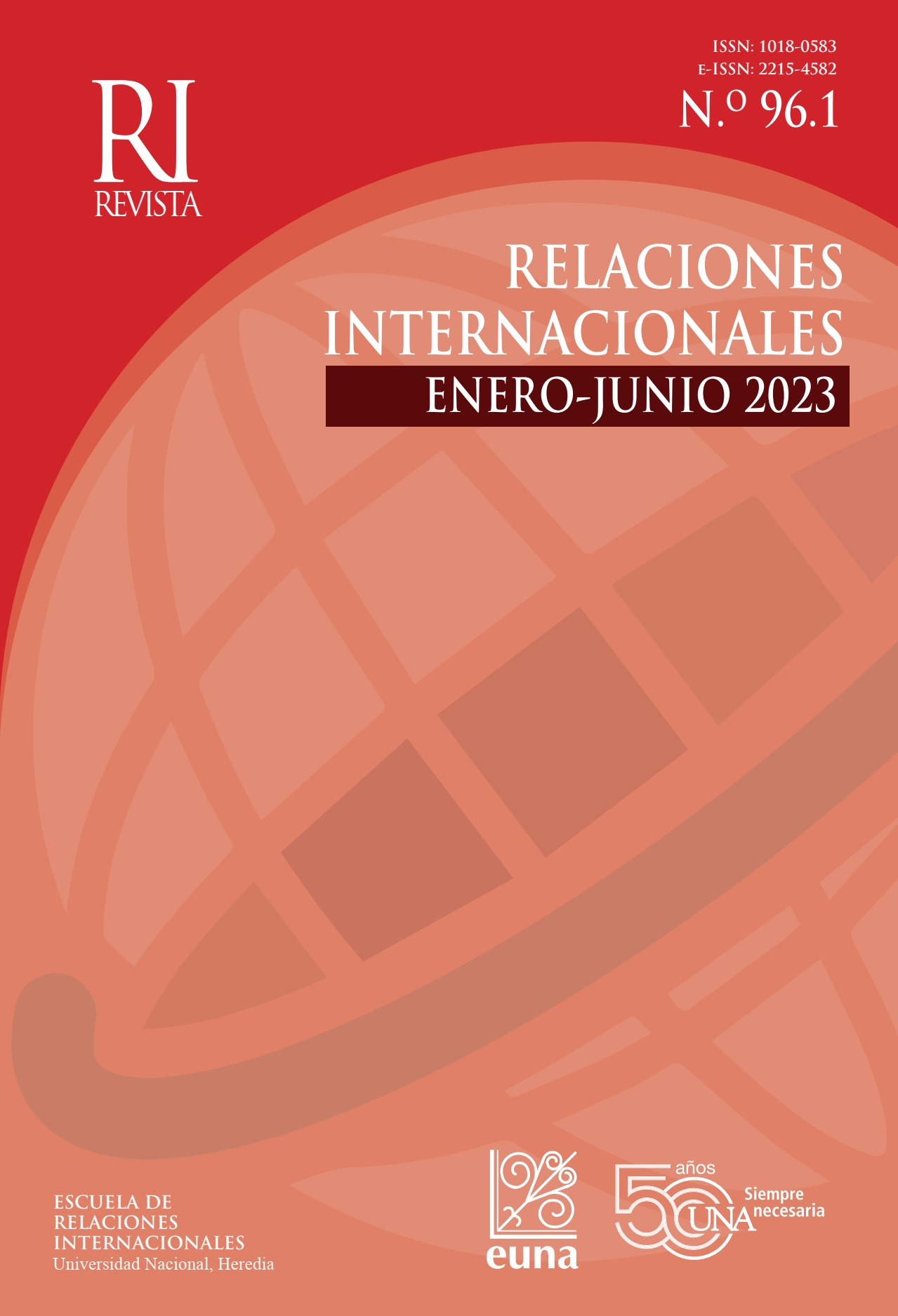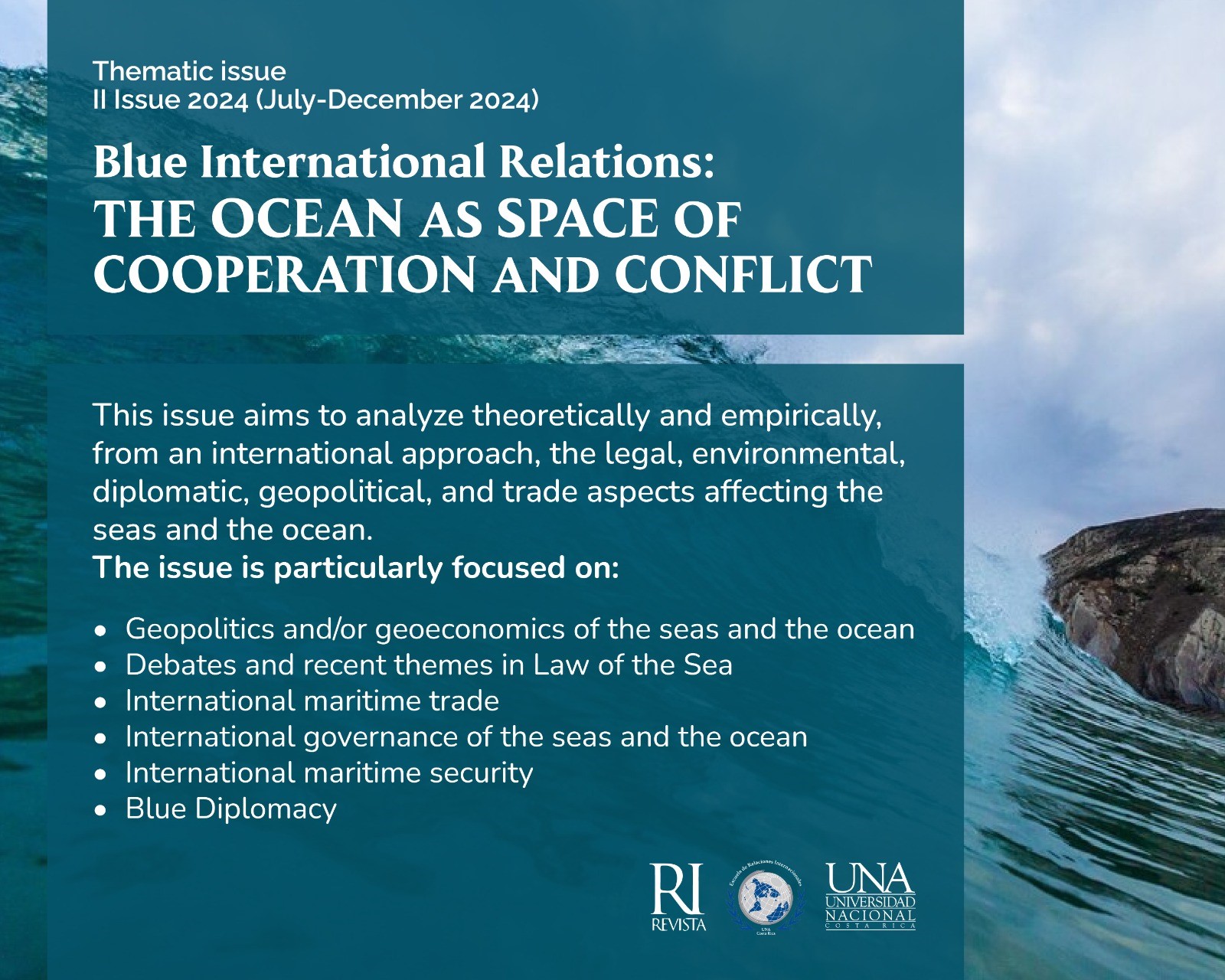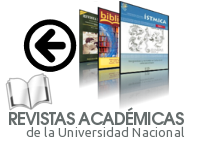UNA's 50th Anniversary: An International View
Keywords:
Costa Rica, International Relations, international politics, higher education, history, Universidad NacionalAbstract
The Universidad Nacional is an institution characterized by humanism and inclusion as core principles that are explicit in the interest of supporting the most vulnerable sectors in society. This interest in the person and inclusion is not just the result of the national context but the legacy of previous institutions and the complex international background when the institution was founded. Thus, this Editorial aims to contextualize the history of Universidad Nacional by using some international issues considered as relevant due to its scope.
References
Arreguín-Toft, I. (2001). How the Weak Win Wars. A Theory of Asymmetric Conflict. International Security, Vol. 26, N. ° 1 (Summer 2001), pp. 93-128. https://web.stanford.edu/class/polisci211z/2.2/Arreguin-Toft%20IS%20
Arriola P., J. (1992). El fracaso de los programas de ajuste estructural en América Latina. Realidad: Revista de Ciencias Sociales y Humanidades, 30, 627-643.
Brzezinski, Z. (1991). The consequences of the end of the cold war for international security. The Adelphi Papers, 32(265), 3-17. https://doi.org/10.1080/05679329108449071
Brzezinski, Z. (1992). The Cold War and Its Aftermath. Foreign Affairs, 71(4), 31-49. https://doi.org/10.2307/20045308
Buseh, A. G., Stevens, P. E., Bromberg, M., & Kelber, S. T. (2015). The Ebola epidemic in West Africa: challenges, opportunities, and policy priority areas.
Nursing Outlook, 63(1), 30-40. https://doi.org/10.1016/j.outlook.2014.12.013
Carlson, J. (2019). Chernobyl: the continuing political consequences of a nuclear accident. Recuperado 22 de enero de 2023, https://www.lowyinstitute.org/the-interpreter/chernobyl-continuing-political-consequences-nuclear-accident
CEPAL. (1996). AMÉRICA LATINA Y EL CARIBE QUINCE AÑOS DESPUÉS. De la década perdida a la transformación económica 1980-1995. Fondo de
Cultura Económica Chile S. A.Recuperado 22 de enero de 2023, de https://repositorio.cepal.org/bitstream/handle/11362/2003/1/S33898N962A_es.pdf
Cohen, R. (2005). The Tsunami Tragedy: Political, Economic, and Environmental Lessons. Recuperado 22 de ene-
ro de 2023, de https://www.brookings.edu/on-the-record/the-tsunami-tragedy-political-economic-and-environmental-lessons/
Connah, L. (2021). US intervention in Afghanistan: Justifying the Unjustifiable? South Asia Research, 41(1), 70-86. https://doi.org/10.1177/0262728020964609
Council on Foreign Relations. (2023). Eight “Hot Wars” During the Cold
War. (2023). World101. Recuperado 22 de enero de 2023, de https://world101.cfr.org/how-world-works-and-sometimes-doesnt/conf lict/
eight-hot-wars-during-cold-war
Cummings, R. E. (2020). Writing knowledge: Wikipedia, public review, and peer review. Studies in Higher Education, 45(5), 950-962. https://doi.org/10.1080
/03075079.2020.1749791
d’Appollonia, A. (2016). ‘Securitization after 9/11’, Frontiers of Fear: Immigration and Insecurity in the United States and Europe. Cornell Scholarship Online. Ac-
cessed 22 Jan. 2023, https://doi.org/10.7591/cornell/9780801450686.003.0004
Davies, M., & Hobson, C. (2022). An embarrassment of changes: International Relations and the COVID-19 pandemic. Australian Journal of International Affairs, 0(0), 1-19. https://doi.org/10.1080/10357718.2022.2095614
Diligensky, G. & Chrugrov, S. (2000). “The West” in Russian Mentality. Recuperado 22 de enero de 2023, https://www.nato.int/acad/fellow/98-00/diliguenski.pdf
Fenby, J. (2017). How events in China in the 1990s shaped the world we live in now. The Guardian. Recuperado 22 de enero de 2023, https://www.theguardian.com/world/2017/apr/23/how-events-in-china-in-the-1990s-shaped-the-world-we-live-in-now
Franke, W. (2002).The Social Construction of Man, the State and War Identity, Conflict, and Violence in Former Yugoslavia. 1st. Ed. Routledge.
Gauthier, A. (2010). Haiti: Geopolitical Turmoil in the Wake of the Earthquake (ARI). Real Instituto elcano. Recuperado 22 de ene-
ro de 2023, de https://www.realinstitutoelcano.org/en/analyses/haiti-geopolitical-turmoil-in-the-wake-of-the-earthquake-ari/
Gohel, S. & Jones, V.(2021). America Is Going the Same Way as the Soviets in Afghanistan. Foreign Policy. Recuperado 22 de enero de 2023, de https://foreig-
npolicy.com/2021/02/18/soviet-withdrawal-afghanistan-parallels-u-s-biden/
Gu, X. (2022). Structural Power in the Global Age Why Modernity is Ending and Globality Prevails. Springer Cham. https://www3.weforum.org/docs/WEF_
Global_Risks_Report_2023.pdf
Human Rights Council. (2022). Report of the Independent Investigative Mechanism for Myanmar. General Assembly. A/HRC/51/4. Recuperado 22 de enero de
TK9BQL5X7Z*MTY3NDQ0Mzk4Ni42LjAuMTY3NDQ0Mzk4Ni4wLjAuMA..
International Crisis Group. (2015). The Politics Behind the Ebola Crisis. Africa Report N.° 232. Recuperado 22 de enero de 2023, de https://www.files.ethz.
ch/isn/194493/232-the-politics-behind-the-ebola-crisis.pdf
Keller, E. J. (1992). Drought, War, and the Politics of Famine in Ethiopia and Eritrea. The Journal of Modern African Studies, 30(4), 609-624. https://doi.org/10.1017/S0022278X00011071
Kreps, S. (2020). Social Media and International Relations. Elements in International Relations. Cambridge University Press. https://doi.org/10.1017/9781108920377
Lardy, N. R. (2001). Issues in China’s WTO Accession. Brookings. Recuperado 22 de enero de 2023, de https://www.brookings.edu/testimonies/issues-in-chinas-wto-accession/
LeDuc, J. W., & Barry, M. A. (2004). SARS, the First Pandemic of the 21st Century. Emerging Infectious Diseases, 10(11), e26. https://doi.org/10.3201/eid1011.040797_02
Lipman, M. (2015). How Russia has come to loathe the West. Recuperado 22 de enero de 2023, https://ecfr.eu/article/commentary_how_russia_has_come_to_loathe_the_west311346/
Morales-Camacho, M. (2022). COVID-19: Perspectivas desde los Estudios Internacionales. Relaciones Internacionales, 95(2), 7-14. Recuperado a partir de
https://www.revistas.una.ac.cr/index.php/ri/article/view/17461
Mueller, J. (2000). The Banality of “Ethnic War”: Yugoslavia and Rwanda. Recuperado 22 de enero de 2023, https://politicalscience.osu.edu/faculty/jmueller/apsa2000.pdf
Newport, F. (2008). Americans See Obama Election as Race Relations Milestone. Recuperado 22 de enero de 2023, de https://news.gallup.com/poll/111817/
americans-see-obama-election-race-relations-milestone.aspx
Núñez, B. (1974). Hacia la universidad necesaria. Recuperado 22 de enero de 2023, de https://documentos.una.ac.cr/bitstream/handle/unadocs/5972/
hacia%20la%20Universidad%20Necesaria.pdf?sequence=1#:~:text=La%20universidad%20necesaria%20producir%C3%ADa%20una,estudio%20
e%20investigaci%C3%B3n%20primordialmente%20a
Ozalp, M. (2018). World politics explainer: The Iranian Revolution. Recuperado 22 de enero de 2023, de https://theconversation.com/world-politics-explainer-the-iranian-revolution-100453
Parker, R. (2002). The Global HIV/AIDS Pandemic, Structural Inequalities, and the Politics of International Health. American Journal of Public Health, 92(3),
-347.
Ramberg, B. (1986). Learning From Chernobyl. Foreign Affairs, Winter 1986/87. https://www.foreignaffairs.com/articles/chechnya/1986-12-01/
learning-chernobyl
Rostow, E.V. (1992). United States Foreign Policy After the Soviet Collapse. SAIS Review 12(2), 1-21. doi:10.1353/sais.1992.0036.
Rychnovská, D. (2014). Securitization and the Power of Threat Framing. Perspectives, 22(2), 9-31. http://www.jstor.org/stable/24625251
Serrano, F. (2010). Estado, golpes de Estado y militarización en América Latina: una reflexión histórico política. Argumentos, 23(64), 175-193.
Siripurapu, A. & Merrow, W. (2021). Social Media and Online
Speech: How Should Countries Regulate Tech Giants? Recu- perado 22 de enero de 2023, de https://www.cfr.org/in-brief/social-media-and-online-speech-how-should-countries-regulate-tech-giants
The Dialogue. (2016). Latin America Since 1980: Political & Economic Changes. Recuperado 22 de enero de 2023, de https://www.thedialogue.org/ blogs/2016/04/latin-america-since-1980-political-economic-changes/
Torres-Rivas, E. (1981). Seven Keys to Understanding the Central American Crisis. Contemporary Marxism, 3, 49-61. https://www.jstor.org/stable/29765685
UNA. (s. f. a). Misión y visión. Recuperado 22 de enero de 2023, de https://www.transparencia.una.ac.cr/index.php?option=com_content&view=article&id=
&Itemid=742
UNA. (s. f. b). Principios, valores y fines. Recuperado 22 de enero de 2023, de https://www.transparencia.una.ac.cr/index.php?option=com_content&view
=article&id=299&Itemid=743
UNCTAD. (2022). Impact of the COVID-19 Pandemic on Trade and Development: Lessons Learned. UNCTAD/OSG/2022/1. Recuperado 22 de enero de 2023,
de https://unctad.org/system/files/official-document/osg2022d1_en.pdf
UNFCCC. (s. f.). The Paris Agreement. Recuperado 22 de enero de 2023, de https://unfccc.int/process-and-meetings/the-paris-agreement/the-paris-
agreement#:~:text=The%20Paris%20Agreement%20is%20a,compared%20to%20pre%2Dindustrial%20levels.
World Economic Forum. (2023). The Global Risks Report 2023. 18th Edition. Recuperado 22 de enero de 2023, de https://www.weforum.org/reports/
global-risks-report-2023/
Zúñiga, M. (2014). Guerra y sociedad en Centroamérica: preguntas necesarias, respuestas pendientes (sugerencias a raíz de un proceso de investigación).
Policy brief. CLACSO. Recuperado 22 de enero de 2023, https://biblioteca.corteidh.or.cr/tablas/4693.pdf
Published
How to Cite
Issue
Section
License

Revista de Relaciones Internacionales por Universidad Nacional de Costa Rica está bajo una Licencia Creative Commons Atribución-NoComercial-SinDerivar 4.0 Internacional








1.png)







3.png)
